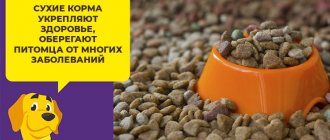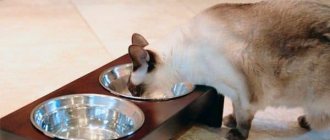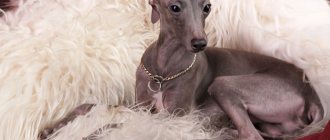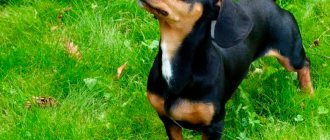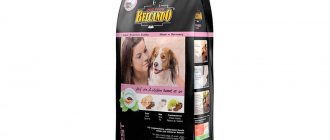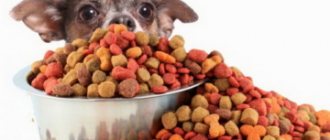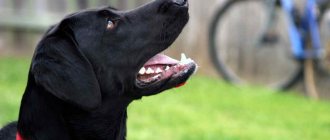The question of what to feed your dachshund is not as simple as it seems. In the minds of many, the dachshund is an indoor animal that does not require much attention to its diet. However, despite their small size and cute appearance, representatives of the breed are quite serious hunting dogs. They are not created for lying on sofas, but for chasing prey. The main function of dachshunds is to drive foxes and other hard-to-reach animals out of their holes.
What to feed your dachshund
In perseverance, hunting passion and endurance, these small dogs are not inferior to their larger counterparts. Even if the dachshund does not hunt, it needs frequent long walks, active games and sufficient exercise. So what components should be included in the ideal diet of a miniature hunter? Let's figure it out.
Dachshunds: nutritional features
Naturally, such a lifestyle requires proper nutrition: balanced, complete, sufficient, but excessively plentiful. When deciding what to feed your dachshund, you need to consider:
- age;
- motor activity;
- accommodations;
- owner capabilities;
- individual characteristics of the pet.
The diet largely depends on the type of dachshund
Dachshunds come in standard and toy varieties, smooth-haired, long-haired and short-haired. Miniature dogs need a more nutritious, but lower calorie diet. If they regularly overeat, they are at risk of obesity, joint problems and even diabetes. Long-haired dogs require supplements to improve hair quality and prevent hair loss.
Domestic dachshunds should be strictly limited in their treats.
If your Dachshund leads a domestic lifestyle, it is important to strictly monitor portion sizes. Like other small dogs, representatives of this breed tend to overeat, they are constantly begging for more and treats. To avoid temptation, the owner must teach the pet not to approach the table during family meals and not to take treats from the hands of strangers.
Due to the fact that the main load is on the joints of dachshunds, obesity quickly leads to their diseases.
For dogs that are taken for hunting, the diet is increased by adding protein. At the same time, the amount of carbohydrates must be limited; they cause fatigue and contribute to weight gain. Obesity is very harmful for dachshunds; excess weight puts enormous stress on the joints.
Another feature of dachshunds is their tendency to food allergies. They can manifest themselves in the form of itching, vomiting, diarrhea, focal baldness, dandruff, and swelling. Most often, a negative reaction is caused by natural products, for example, exotic fruits, chicken meat or cereals.
Dachshunds' predisposition to allergies prompts stricter food selection
Having identified a possible allergen, it must be excluded from the menu once and for all. You will have to carefully review the composition of dry industrial feeds; they usually include ground cereals and freeze-dried chicken.
Diet composition
A dog's diet is different from a human's. Some foods we eat can cause irreparable harm to a dog. That is why every owner should know what to feed their dachshund.
Meat
Meat should be present in the diet daily. About one third of all food consumed should be meat.
It is better to give preference to lamb, turkey and lean beef. Fatty meat, especially pork, is very harmful as it can cause stomach upset. Well, chicken meat, especially the skin, in some cases, can provoke allergic reactions. Any meat must be boiled before serving, but if you can be one hundred percent sure of its quality, it is offered to be tasted raw.
For those who want to know how to feed a dachshund correctly, it is better to familiarize yourself with some of the nuances. For example, it is better to offer a dog not tender tenderloin, but stringy, coarse meat. This not only activates the functioning of the gastrointestinal tract, but also trains her jaw and strengthens her teeth, because she tears off pieces and chews them.
Kidneys, liver, brains and other offal are an excellent source of vitamins, enzymes, proteins, but they can be offered to your pet only after 4 months of age. In this case, the portion is increased gradually due to the risk of allergies.
Fish – is that really what dachshunds eat? Yes, this is also meat, but in the daily diet there should be twice as much of it as, for example, turkey. Sea fish is an excellent solution; its meat easily separates from the bones.
It is better to boil the fish first. Boiled river fish can also be offered to the dog, but first it is passed through a meat grinder several times to grind the bones.
It should be noted that it is strictly forbidden to give bones to dogs; they can cause many intestinal diseases!
Cereals
Almost half of the dachshund's daily diet consists of various cereals: rice, buckwheat, oats, rolled oats. They are rich in microelements, promote good functioning of the gastrointestinal tract and saturate the body for a long time. Moreover, it is better not to give porridge from legumes and semolina. The first can lead to bloating, and the second - obesity.
When preparing porridge, it is better to periodically change its composition, that is, the types of cereals. This will help diversify your food and enrich the body with various microelements. Hercules porridge can be steamed with boiling water rather than boiled. But pearl barley is absorbed by only 30-40 percent.
Vegetables and fruits
It’s impossible to imagine, but the dog loves fruit very much. She eats apples, pears, bananas and dried fruits with great pleasure. Fruits containing vitamins for the dachshund are not only healthy, but also clear plaque.
It is not recommended to give your pets exotic fruits or treats that belong to the group of allergens. These are strawberries, citrus fruits, as well as strong-smelling greens - cilantro, celery. If your furry friend really wants to try something exotic, then you can give it very little and infrequently.
You can replenish your supply of vitamins with scalded nettles, dandelions or sprouted oats. It should be noted that fruits and vegetables are rich in fiber, which is so necessary for the normal functioning of the human intestines. But, unfortunately, it cannot be digested by the body of predatory animals.
Therefore, before feeding your dachshund vegetables, you should chop or grate them. But even in this form, the dog is reluctant to eat the offered dishes. Vegetable oil added in small quantities will help make them a little more appetizing. Another way to increase the digestibility of vegetable dishes is heat treatment. But as a result, a colossal amount of useful substances is destroyed.
Therefore, it is best to combine raw and stewed-boiled cooking options. Vegetables can be boiled whole, then chopped to a puree consistency.
Every owner who is puzzled about what to feed his dachshund should know that it is better to boil or stew potatoes. It is also not recommended to give cabbage raw; it causes fermentation in the stomach. Well, the maximum share of vegetables and fruits in the daily diet is 40%.
Milk and eggs
The main diet of a dachshund puppy consists of dairy products. In its main form, milk is given to babies up to 4 months. Then, it is replaced with products such as kefir, yogurt, cottage cheese, cheese, fermented baked milk, and yogurt. They contain useful minerals, vitamins and proteins, which are so necessary for the normal functioning of the animal. Milk is added to porridge after the cereal has already been boiled. Well, sour cream is an overly fatty ingredient, so its consumption should be limited.
Eggs, rich in vitamins and protein, are still not digestible by dachshunds in their raw form, so it is better to boil them or make an omelet. You can supplement your weekly diet with them, but in limited quantities - no more than two pieces. One quail egg per day is what you are allowed to feed your dachshund puppy. It is also recommended to enrich the diet with them during pregnancy. But you need to remember about the possibility of an allergy to protein.
Seafood
In addition to fish meat, the following types of seafood of animal and plant origin can be used for cooking:
- squid;
- mussels;
- crabs;
- seaweed;
- seaweed.
These products are indispensable during the period of vitamin deficiency; they are a storehouse of vitamins, minerals, especially iodine. The quality of your pet's coat is noticeably improved by adding a small amount of seaweed to its food. But you should also remember about the possibility of allergic reactions.
Bread, sugar, salt
Before feeding an adult dachshund, you should remember that excess sugar and salt are very harmful even to humans. Dog dishes should be very under-salted, and sugar should be completely excluded from consumption or replaced with simple carbohydrates - fructose, glucose, honey.
It is strictly forbidden to give furry pets ice cream, condensed milk, sweet cottage cheese or other sweets.
It is better to replace soft white bread with rye crackers. Cookies, pastries, and muffins will not bring any benefit to your pet’s health; they are high in calories and too sweet for him.
Vegetable oil, nuts, seeds
A small amount of vegetable oil can be used to season various dishes. This is a good way to regain your appetite, but don't overdo it. They like sunflower, corn or soybean oil.
Hulled seeds or nuts are an excellent source of amino acids and vegetable fats. Occasionally you can give such a treat.
How to properly feed a dachshund with natural products?
Many owners choose natural food, believing that this food meets all the dog’s needs. However, porridge with small inclusions of meat or soup cooked for the whole family can hardly be considered a balanced diet.
If you decide to feed your pet natural food, you need to know in advance the basic principles of the correct menu. Among the basic principles are the following:
- Food must be freshly prepared. It is boiled in the morning, brought to the desired temperature and used until the end of the day. If the dog does not have allergies, you can prepare food for 2 days and store it in the refrigerator;
- Food should have a comfortable temperature - about 36-38 degrees. Food that is too cold does not attract the dog; food that is too hot can cause injuries to the mouth and esophagus;
- The ideal food has a moderately thick consistency. Thin soups do not satiate your dog;
- Food for the dog is prepared separately. There is no need to add salt, sugar, spices, or additional fats;
- Adult dogs should not be given pureed food. For normal jaw development and dental health, cutting into small pieces is preferable.
Vitamin supplements are not universal and are divided into groups according to the age and condition of the pet.
Vitamins must be added to prepared food, which can be easily purchased at any pet store or special veterinary pharmacy. Balanced complexes with valuable minerals are suitable; their choice depends on two criteria:
- age;
- physical condition of the pet.
You can select formulations for very small puppies, “teenage” puppies, pregnant and lactating bitches, elderly or weakened pets.
Making a balanced diet
The basis of homemade food should be natural animal protein. The meat components chosen are chicken, turkey, rabbit, beef, and veal. You can use sea fish without bones, but it is advisable to alternate it with meat.
Beef by-products are rich in protein, essential for couch potatoes
A good addition to the diet is fresh offal. Beef tails and tripes, lungs, heart, and liver are suitable. Chicken feet (finger part) and beef cartilage are useful. These products are rich in valuable microelements that are not found in selected parts of carcasses.
An obligatory component is grains. Dachshunds tolerate buckwheat and rice well. It is possible to add rye or wheat bran. Other types of cereals are undesirable. The total percentage of complex carbohydrates in the daily diet is no more than 30.
Some owners note the special love of dachshunds for grapes and apples
Vegetables and fruits are designed to ensure normal digestion. Most dogs love them, but if the dog refuses the product, you can puree the vegetables or chop them very finely, disguising them with meat and grains. The daily diet includes fresh and boiled zucchini, rutabaga, carrots, cucumbers, green beans, cobs and corn grains. All types of cabbage are useful: cauliflower, white cabbage, Brussels sprouts, Savoy, kohlrabi.
Representatives of the breed do not refuse to crunch on fresh vegetables.
Cottage cheese of moderate fat content is very useful for puppies and young dogs. From time to time it is also given to adult dachshunds, replacing one of the meat feedings. You can add a chicken or quail egg to the cottage cheese if the dog tolerates it well.
Unrefined vegetable oil will help improve digestion. However, it can only be added to food for dogs that are not prone to diarrhea.
Video - What to feed an adult dachshund?
Vitamins for dachshunds
Dachshunds are often deficient in phosphorus and calcium, and their skeletal features require active joint protective supplements (glucosamine). Proven complexes for dachshunds:
8in1 Excel Calcium (Calcidee)
Based on the balance of phosphorus, calcium and vitamin D, it combines well with other complexes, in some cases it is recommended to be fed along with dry food. Suitable for puppies, pregnant and lactating bitches.
8in1 Pervinal Excel Puppy Multi Vitamin
A complete complex of 12 vitamins and 10 minerals, suitable for rapidly growing dogs.
8in1 Excel Glucosamine
Chondroprotector, contains glucosamine and chondroitin, which protects the cartilage of the intervertebral joints, as well as the joints of the limbs, from destruction.
Stop menu: products that need to be excluded
Most foods that are inappropriate for dachshunds are not recommended for dogs at all. They can cause allergies, stomach upset, poisoning or injury to the esophagus.
Table 1. Prohibited foods for dachshunds
| Product | Reason for exception |
Smoked meats, pickles | Contain too much salt, dyes, flavors and additives harmful to dogs. Unfortunately, gourmet dachshunds are very fond of sausage, frankfurters, and stew, but they should not be given even as a treat. |
Whole milk, cream, butter | Excess milk fat causes diarrhea and subsequent dehydration. Some dogs also do not tolerate high-fat fermented milk products, such as kefir and cottage cheese. |
Pork and lamb | These types of meat are rich in fat and are poorly digestible. |
Raw river fish | Source of dangerous helminths. It is preferable to give sea fish without bones, pre-cooked. |
Sweets | Sugar is very harmful for dogs of any breed, and for dachshunds in particular. |
Food from the hosts' table | Dishes are usually seasoned with a lot of salt and sugar, contain excess fat, spices, and flavorings. Such food should not be given even as a treat. |
Exotic fruits | A common source of allergies and eating disorders. Excess acids found in pineapples, passion fruit or papaya are harmful to dogs. |
Cereals | Can provoke dermatitis, itching and other allergic manifestations. Especially harmful for dachshunds with digestive problems. |
Ready minced meat | Contains excess fat, possibly including soy, onions, spices and other additives harmful to dogs. |
Tubular and fish bones | They can cause injury to the esophagus. To train dogs' jaws, it is better to offer them a tasty sugar bone, chicken paw or special treats based on beef cartilage. |
The list of prohibited foods includes fresh, fried or boiled onions, potatoes, bread and pastries, and raw chicken (with the exception of paws).
Make it a rule not to confuse your dachshund with a trash can and not to give it food scraps that you need to get rid of.
Dachshunds should not be fed any leftovers or scraps, food that is too hot or cold, or expired food. All this can cause severe poisoning.
Industrial feed
This type of food also has its pros and cons.
Advantages:
- The food is sold ready-made;
- No need to waste time on preparation;
- These foods have a varied composition, you can choose according to your dog’s taste;
- Artificial food is already completely balanced, the dog receives all the necessary vitamins;
- There are foods specifically for dachshunds;
- Premium food and higher do not pose any harm to the health of the animal.
Flaws:
- There is no guarantee that the packaging contains the correct composition of the product;
- The composition contains various flavoring additives, emulsifiers and preservatives;
- Incorrectly selected food will cause allergies;
- Cheap food does not contain meat, but soy and low-quality by-products. This provokes diseases.
NOTE!
Many breeders still prefer artificial food, believing that it is a complex of all the vitamins necessary for a dog.
There are also two types of industrial feed - dry and wet. Some owners choose just one, but the best option is to combine them.
For example, a dog receives wet food for breakfast and dry food for lunch. This is a great way to maintain water balance in the animal's body .
Plus, dry food lasts longer, and you can easily remove the bowl if the animal does not finish the food and leave it for the next meal.
As already mentioned, there are specialized foods for dachshunds:
- Summit food;
- ANF Holistic food;
- Farmina N&D food;
- Guabi Natural food;
- Wolfsblut dry food.
There are 4 classes of dog food - economy, premium, super premium and holistic . The best food for dachshunds should be super premium or holistic.
Proper nutrition for growing dachshunds
It's no secret that at different periods of life a pet needs its own diet with its own amount of vitamins and other useful supplements. Let's look at the early period of development of dachshunds and see what features their feeding includes.
Newborn puppies
Newborn dachshund puppies feed exclusively on their mother's milk. During this period, it is important to provide the bitches with a nutritious diet. If the mother eats natural, freshly prepared food, vitamin supplements for pregnant and lactating dogs are added to it. Those who eat industrial feed are given balanced diets for lactating bitches. They contain increased amounts of calcium, magnesium, iron, and vitamins that are important for the development of rapidly growing puppies.
Particular attention should be paid to the diet of the bitch who gave birth and select food based on the appropriate line
If the mother does not have enough milk, small dachshunds are fed a balanced formula from a bottle. Dry powder for breeding and teats are sold in veterinary pharmacies. Orphaned puppies who were unable to find a wet nurse are also fed the same way.
Milk should be given the main place in the diet of newborn puppies; it is irreplaceable
At three weeks of age, puppies begin to be accustomed to solid food. The first complementary food can be canned meat for babies. They contain natural high-quality meat that does not cause allergies (chicken, turkey, beef, rabbit, lamb). Canned food with crushed rice or buckwheat will also work. You need to start with small portions, no more than 1 teaspoon. Gradually the amount of the new product is increased, carefully monitoring the reaction of the puppies. By one month, canned meat can completely replace one feeding.
As puppies grow older, canned meat is gradually introduced into the food system.
At one month of age, puppies begin to be fed liquid soups with the addition of vegetables and cereals. Soups are cooked in chicken or beef broth with buckwheat or rice; grated carrots or zucchini and finely chopped boiled meat are added to the finished dish. At this age, puppies are fed up to 6 times a day, preferably at the same time, to stimulate normal digestion. A single serving for ordinary dachshunds is 2-3 tbsp, dwarf dachshund puppies receive 1-1.5 tbsp. l. stern.
Dachshund puppies are more likely to eat warm food than cold food.
One-month-old puppies can also be fed commercial food. Canned food is suitable for small breed puppies. Dachshunds readily eat meat with grains in the form of puree; to increase the attractiveness of the new food, it can be slightly heated. A little later, the canned food is replaced with food for puppies in granules, after soaking them in warm boiled water.
Puppies from two months
At the age of 2 months, puppies are fed up to 4 times a day, increasing portions to 4-5 tablespoons. The ideal diet includes thick meat soup with cereal and grated or finely chopped vegetables, homemade cottage cheese, curdled milk or yogurt, which replace one feeding. 3-4 times a week, puppies are given a quail egg; from time to time, instead of a meat dish, you can prepare a soup based on low-fat sea fish, such as cod. The diet remains unchanged for up to 4 months.
Please note that cottage cheese should be given to your dachshund with caution - some dogs are allergic to it
At five months of age, grown puppies can be switched to commercial food, alternating between dry granules and canned food. Young dogs can be fed mixed food, but you should not combine homemade and commercial food in one meal. By 6 months, the puppy begins to eat 3 times a day, this regime continues until the age of one year. By 12 months, dogs are switched to two meals a day.
What to feed an adult dachshund
Overfeeding leads to obesity, heart disease, urinary system and skin diseases, so increased nutrition is recommended for sick and convalescent pets, pregnant and lactating bitches, during molting or hunting.
But the dachshund also does not have to starve: if there is a lack of food, it weakens and becomes susceptible to disease . A male dog, mated about 5 times per season, is fed more densely before mating, but it is not the volume of food that is increased, but the proportion of proteins and vitamins.
Diet from year
Hunters advise not to feed dachshunds with tender flesh, but to use meat waste: cartilage, heads, wings, membranes, spleen, stomach, legs, lungs, intestines, mesenteries. Waste from the stomach/intestines is given only boiled to destroy dangerous bacteria.
Also in the diet are:
- raw sea fish (once a week);
- raw egg (once every 7 days);
- semi-liquid porridges (semolina, rice, millet, barley and oatmeal);
- pumpkin (steamed or boiled) and soybeans;
- fruits/berries (occasionally);
- fresh or fermented (but not sour!) milk;
- bread in the form of crackers soaked in milk/soup (preferably rye).
Important! Dachshunds need table salt. When you cook soup or porridge, add some salt, keeping in mind that your dog needs half as much salt as you do.
Diet for older dogs
The “pensioner” is transferred to 3 meals a day . Older dachshunds often act strangely: they are picky, eat poorly, or, conversely, eat everything they see. Bulimia is fraught not only with obesity, but also with poisoning.
The calorie content of food is reduced taking into account slow metabolism and reduced physical activity, including stress on the spine (jumping and running up stairs). If a dog is accustomed to “drying”, after 7 years he is given food with a reduced percentage of protein (15-21).
Monitor your bone health by including medications with chondroprotectors and vitamins in your food, for example “Dekamevit” (courses).
Return to content
Ready-made food for dachshunds
Owners who have opted for ready-made feed give a lot of arguments in their favor. Among the main ones:
- a balanced diet with the required amount of microelements, vitamins, amino acids;
- the ability to choose food for puppies, miniature varieties, especially active or elderly dogs;
- many lines offer medicinal food for pets with diseases of the liver, kidneys, and gastrointestinal tract;
- There are both dry and wet food available for sale, providing complete nutrition;
- Ready-made food is always fresh and can be stored for a long time in unopened packaging;
- there is no need to add vitamin complexes, oils and other components to food.
Potential harm of economy food
In order for industrial feed to bring only benefits, you need to give preference to premium and super-premium products. Economy-grade food sold in supermarkets is not nutritious enough. In order for a dog to gain its daily calorie intake and not feel hungry, it is necessary to increase portions, which negatively affects the animal’s weight.
Eating economy class food, the dachshund will not have time to burn the calories it consumes
In addition, economy food contains many not very useful additives, from dyes to flavors. They can cause diarrhea or allergies, which Dachshunds are especially prone to. Unfortunately, many dogs like economy food because it has a brighter taste.
Super-premium or holistic: what to choose?
Professional dachshund breeders recommend choosing between super-premium and holistic food. The first category includes mixtures with a high content of natural meat, without the addition of offal. They have a balanced composition and do not contain artificial flavors or dyes. The basis of high-quality food is natural animal protein.
Premium class differs from economical class in the absence of flavorings and the use of the best parts of meat
The most commonly used meat is chicken, turkey, and lamb. These types of meat rarely cause allergies and are well digestible. Expensive super-premium foods do not contain low-nutrient deboning products; their composition is dominated by high-quality carcass parts.
Holistic food is recommended for dachshunds with digestive problems. The mixtures contain natural high-quality meat or fish (at least 50%), supplemented with a small amount of grains and vegetable fiber. The dog gets the necessary vitamins and microelements from vegetables, berries, and fruits. This is a reasonable compromise between industrial and natural food, combining all their advantages and eliminating the disadvantages.
Dachshund owners with allergies or gastrointestinal problems should pay attention to Holistic class food.
Premium food is also suitable for owners of healthy animals. Their main difference is the reduction in the proportion of meat due to the addition of offal and grains. High-quality food is well digestible and is liked by many animals. When choosing a diet, you need to take into account the age of the dog. There are options for sale for puppies, teenagers, pregnant and lactating bitches, elderly or weakened dogs.
The composition of food for dachshunds recovering from surgery and undergoing treatment should differ from the usual
Special lines of food for dachshunds
Some brands offer therapeutic lines that include products for chronically ill, convalescent, and post-surgical animals. There are formulations specifically designed for dachshunds. If they are not available, you can choose food for small dogs, smooth-haired or long-haired.
If you feel confused by the variety of existing foods, then below is a short list of those brands that pet owners most often choose.
Table 2. The most popular industrial food for dachshunds
| Feed | Category | Description |
Pro Plan | Premium | Depending on the age of the dachshund, formulations are suitable for small dogs, puppies up to 6 months and older animals of small breeds. The food is made without artificial additives, colors and flavors; it is based on lamb or chicken meat, fish, and steamed rice. The normal condition of animals is guaranteed by complete mineral complexes and vitamins. The line includes dry food and spiders, and there are hypoallergenic treats for training. |
Royal Canin | Premium | A French brand offering a wide range of dry and wet food, as well as ready-made treats. There is a special diet for dachshunds, formulations for puppies, pregnant and lactating females, weakened and elderly dogs. The veterinary line includes dry and wet food for convalescent animals and animals with digestive problems. In many pet stores, food from the main line is sold by weight, this allows you to choose the right food without overpaying for large packaging. |
Brit Care | Super premium | Ideal for active dachshunds leading an active lifestyle, as well as for growing puppies. Occupies an intermediate place between super-premium and holistic. Contains lamb or chicken meat (up to 45%), steamed rice, dried fruits, herbal extracts, balanced mineral supplements. There are lines for older dogs and pets prone to obesity. |
Acana | Holistic | The line includes food with chicken, lamb, fish, supplemented with a mineral complex, rice or bran. Special formulations for dachshunds are not available; it is recommended to choose among diets for puppies and adult dogs of small breeds. |
Almo Nature | Holistic | They produce several types of food for small dogs and puppies. Contains minimally processed meat or fish product, rosemary oil, steamed rice or oats, freeze-dried vegetables and fruits. Wet and dry foods are highly digestible, and there are options for pregnant and lactating dogs, as well as special formulations for seniors. |
Arden Grange | Holistic | Recommended for dogs prone to allergies. Free of soy, dairy and gluten. Contains natural meat or fish (from 20%), rosehip extract, flax seeds, freeze-dried beets. Recommended for puppies and pets with digestive problems. There are no special formulations for dachshunds; when choosing, you should focus on the weight of the animal. |
It is necessary to monitor the quality of water consumed by the dachshund
Dogs fed commercial dry food must have clean water available at all times. It is preferable to give your pets water from a filter or bottled; it is free of harmful additives. Drinks are changed daily, and the water container should be large enough.
Choosing the right food
After a year, it is recommended to switch the dog to two meals a day. The diet can consist only of dry food, natural products or a mixed type. It is important to remember that it is forbidden to give food and natural products at the same time.
The following factors influence the choice of food:
- How active is the pet and how old (months) is it?
- composition and nutritional value of feed.
Many dachshund owners choose dry food and consider their decision to be justified and correct. This is because the food is developed and produced according to certain standards. The norm is calculated individually, depending on the weight, age, and activity of the dog. An adult dachshund eats 150 grams of dry food per day.
All feed is divided into segments. These are: economy and premium class, there is also a super-premium class.
The more affordable the price of food, the lower the concentration of meat and energy value. Unscrupulous manufacturers add a lot of chemical elements and dyes, which enhance the taste, saving on quality. There are no nutrients, vitamins, or minerals in such feeds, because they contain only by-products. Accordingly, in order for the pet to be satisfied with such food, the dose must be doubled.
Premium segment foods are expensive, this is important to consider before choosing a diet. They are quite filling because they contain natural meat, vitamin and mineral complexes. These include the active substances of Royal Canina, ProPlan, Acan, Grandorf and others. Unlike budget companies, premium segment manufacturers do not use preservatives or flavor enhancers. Also, in the composition of feed, meat always comes first.
The minimum protein level is 20 percent. The remaining components are calculated depending on the amount of protein. Dogs over 6 years old can buy food with a protein content of 15 percent or more.
Diet for older dogs
Dachshunds are long-living dogs that remain active into old age. However, with age, metabolism slows down, animals need more nutritious, but less calorie food. After 9 years, professional breeders recommend reducing the amount of protein and adding fiber, which improves digestion. The dog can be fed more often (up to 3-4 times a day), significantly reducing portions. Before making drastic changes to your diet, you should consult your veterinarian.
Over the years, the metabolism of dachshunds slows down, so they should be fed more often, but in smaller portions, paying attention to the nutritional value of the food.
When choosing food, it is important to consider the dog's taste. She may refuse some ingredients outright, while others will be reluctant to eat. If there are no strict instructions from the veterinarian (this is important for chronically ill animals), the owner should experiment by buying several small packages and offering them to the pet one by one. It is important to monitor his appetite and body reactions.
It’s natural for an older dog to want to switch to soft food, but it’s better to combine it with dry food.
It is advisable to feed your dachshund dry granules and canned food from the same manufacturer. You shouldn't mix them. The optimal diet is dry food in the morning and canned food for dinner. Some dogs readily eat wet food and refuse dry food.
Due to irreversible physiological changes, the diet of older pets should be treated with special care. Below we outline the most common health problems in aging dogs and how to correct them with specific nutrition.
Diet of an elderly dachshund
Feeding dry food
Complete dry food from a proven brand is enough to properly feed your dachshund - with it the dog receives everything it needs for growth and development. Do not add vitamins or minerals to your dog’s prepared diet to avoid causing an overdose.
Single portions of “drying” for a dachshund are usually small: the more digestible the food, the smaller. So, a dachshund needs economy class food ~400 g per day, super premium, holistic food - ~40-180 g (the exact amount depends on weight and activity). In the dog's stomach it increases in volume and swells due to water. Don't worry about your pet going hungry by following the manufacturer's recommendations. Remember, the Dachshund is a dog with a good appetite and will gain excess weight if overfed.
How to choose dry food?
Choose premium food or higher for your dachshund, designed for small breeds. Meat and healthy offal (liver, heart) are first on the list. The protein included in the dry diet of an adult dachshund must be at least 22% (meat 40% and above); the amount of other nutrients depends on this figure. A good “drying” should contain little fat and carbohydrates, which cheap foods cannot “boast” of.
Royal Canin Dachshund for dachshunds over 10 months
Premium food. Takes into account the breed characteristics of adult dachshunds: high need for protein to maintain activity and muscle tone, congenital chondrodystrophy and increased load on the spine, jaw structure and grip method, tendency to obesity.
Profine Adult Small Chicken&Potatoes
Czech super-premium food with chicken (45%), corn, potatoes and seafood. Suitable for regulating dachshund weight, preventing joint diseases. Although it is not holistic, it does contain fruit (dried apple) and herbs (basil, sage, fennel).
Wellness Core Healthy Weight grain-free for small breeds
Low-calorie, vitamin- and protein-enriched holistic food with turkey and chicken. The carbohydrate component is potatoes, the vitamin component is apples, carrots, spinach, broccoli, cranberries, blueberries, tomatoes. Suitable for weight regulation, supporting dog joints.
When should you change food?
Food from different brands, but of the same class, does not differ much. Only the dog’s individual preferences and medical indications matter. If the dachshund refuses the offered food or is allergic to it (“the eyes or ears get wet, the hair falls out not during shedding, the dog scratches the skin”), then replace the food or remove allergenic foods (fish, baked goods, fermented milk, smoked meats).
But only if the reason is this, and not parasites or improper maintenance! Offer your pet a trial amount of a different brand of food. If he eats and everything is fine with health, switch to it within 2-3 weeks. Also gradually change “drying” to natural feeding. Monitor your dog and its health.
Dachshund with allergies: how to feed
An allergic reaction to commercial or self-prepared food is a common problem for the breed. Some dogs react negatively to many foods at a young age, but the severity of the reaction decreases over time. Others remain sensitive to food composition throughout their lives.
Advice from experienced breeders will help you avoid problems. They recommend planning your diet very carefully, excluding the most common allergens: grains, chicken meat, offal. It is better to feed the dog in small portions 3-4 times a day. It is advisable to give the same food for several days, this will help to more accurately identify the allergen.
Chicken meat is a common cause of allergies in dachshunds.
Basic Rules
Frequency and serving size
Small puppies should eat before going for a walk, since it is after eating that they need to go to the toilet. Adult dogs, on the contrary, need to be fed after a walk, since activity after eating is contraindicated for them, this can lead to intestinal problems.
Feeding frequency:
- A puppy up to three months old is fed every 4 hours.
- Dachshunds from three to eight months old need to be fed three times a day.
- Dogs older than one year eat no more than twice a day.
Serving size: per 1 kg of dog weight you need to give 40 grams of natural food - this is the amount of daily food for a dachshund.
For an adult dachshund, the protein content of dry food should be about 22%.
Natural products
Natural food does not always provide all the vitamins and minerals an animal needs. Once or twice a year it will be necessary to introduce special drugs into the menu as a separate complex. You should not choose them yourself; this should be done by a veterinarian, depending on the individual characteristics of the animal.
Dachshund lies next to apples
Permitted and prohibited products
Natural animal food must satisfy a number of criteria. Some product groups do not qualify for them. It is not recommended to feed dachshunds the following food package:
- Pork. It is worth denying your pet this type of meat, since it contains a large amount of fat, and it also often serves as a carrier of parasites.
- Boiled and tubular bones. These products often lead to clogging of the animal's intestines, which can subsequently even lead to damage.
- Fatty foods. You can put fried food, butter, high-fat sour cream, etc. in a row.
- Food containing salt and spices.
- Chocolate and other confectionery products. Sugar negatively affects the animal’s tooth enamel, as well as its gastrointestinal tract.
- Sausages and smoked meats. They often contain large amounts of substances that are unsuitable for consumption by pets.
Additional Information! As a reward, you can sometimes give the animal treats such as unleavened crackers, biscuits or crackers.
However, knowing what dachshunds eat is also important, since certain foods should be on the toy breed's menu on an ongoing basis. These include:
- meat of lamb, rabbit, calf and chicken (the latter is best boiled);
- fish;
- rice, rolled oats, buckwheat and millet cereals;
- durum wheat pasta;
- low-fat fermented milk products;
- boiled eggs;
- vegetables and fruits (you need to look at what your pet might like best);
- raw bones (not tubular).
These products can be included in the menu of this dog breed if the pet does not have pathologies of the digestive tract or allergies.
Menu for a dachshund
Sample diet for a dachshund for a week, including lunch and dinner.
| Day of the week | Dinner | Dinner |
| Monday | Raw rabbit, cereal flakes filled with milk, cottage cheese, raw carrots. | Raw beef, grated zucchini, buckwheat porridge. |
| Tuesday | Lean lamb, oatmeal with fermented baked milk and grated apple. | Boiled chicken liver with rice porridge, pumpkin puree with finely chopped herbs. |
| Wednesday | Boiled pollock with rice, stewed cauliflower, seasoned with olive oil. | Boiled beef with millet and grated vegetables. |
| Thursday | Raw beef tripe with millet porridge. Unsweetened yogurt with grated pear. | Low-fat cottage cheese with wheat breadcrumbs. Grated cucumber. |
| Friday | Chicken offal with semolina porridge, tomato. | Raw sprat with buckwheat porridge. Stewed zucchini with herbs, seasoned with vegetable oil. |
| Saturday | Raw chicken breast with rice and sunflower seeds. Apple | Rabbit meat with millet. Pumpkin puree seasoned with corn oil. |
| Sunday | Finely chopped beef, fried pink salmon with oatmeal. Stewed cabbage with tomato. | Dog biscuits with beef bone and fermented baked milk. |
Important! Feeding should be done with warm food. Uneaten food must be removed immediately so that the dog does not overeat and gain weight.
Dachshund with a bone
What to include in your daily diet
Every day the animal's diet should contain up to 60% meat or up to 30% fish. The remaining 40-70% should be almost entirely occupied by cereals. It is also appropriate to use up to 10% of vegetables from the weight of the daily menu. Selecting new ingredients will help diversify your dachshund's diet. They should be introduced gradually, replacing old food, so that the dog does not experience rejection.
What not to give to a dachshund
Excessive consumption of sweets can lead to allergies. Therefore, chocolate and sweets should be kept away and not given to the dog under any circumstances. If you do not give your dachshund dog food, but feed it from the common table, then it is important to remember that, for example, not all the bones should be given to it. Dog breeders know that boiled bones are of no use, and tubular ones can crumble into small fragments, causing damage to the larynx and esophagus.
The body of an adult dachshund does not digest milk well, so this product should not be present in the diet. Pork is considered heavy, so it should not be added to food or served in its pure form. Lamb is also included in the blacklist. Legumes lead to gas formation, and spicy foods, smoked foods and spices provoke the development of gastritis.
Source: fb.ru
Features of feeding puppies
You can find out what is best to feed a dachshund puppy from breeders who have extensive experience in keeping dogs of this breed. A veterinarian can give recommendations on proper nutrition and help create a diet. A lot of information can be found on breed forums.
A very tiny baby is given baby food, pureed in a blender or minced in a meat grinder, with the addition of cereals. Sometimes novice owners try to feed their baby less food than necessary, hoping that the puppy will grow slowly and remain miniature. This will not stop the dog from growing, it will be just like its parents. But lack of food will lead to rickets, developmental delays.
In the question of what to feed a 1-month-old dachshund puppy at home, advice from experienced owners will help. At this age they follow a milk diet. Little by little they begin to introduce solid food: grated vegetables, meat, cottage cheese.
At 1.5 months, babies are offered raw liver, rich in B vitamins necessary for the construction of tissues of the nervous system.
What to feed a 2 month old dachshund puppy? A two-month-old baby is fed boiled fish. The bones are first removed.
A three-month-old puppy's teeth begin to change. At this time he needs a lot of calcium, the dog is offered cartilage.
At 4 months, a puppy’s diet is the same as that of an adult dachshund.
Mixed feeding
There are many supporters of mixed feeding of animals. The correct combination of dry food and natural products will be a good prevention of urolithiasis. You can add meat and vegetables to ready-made food, but not porridge.
Often dog owners buy cheap food and supplement it with natural products at their discretion. This tactic is wrong, since you cannot give your pet both in one meal. You can give your animal dry food for breakfast and then feed it natural food.
